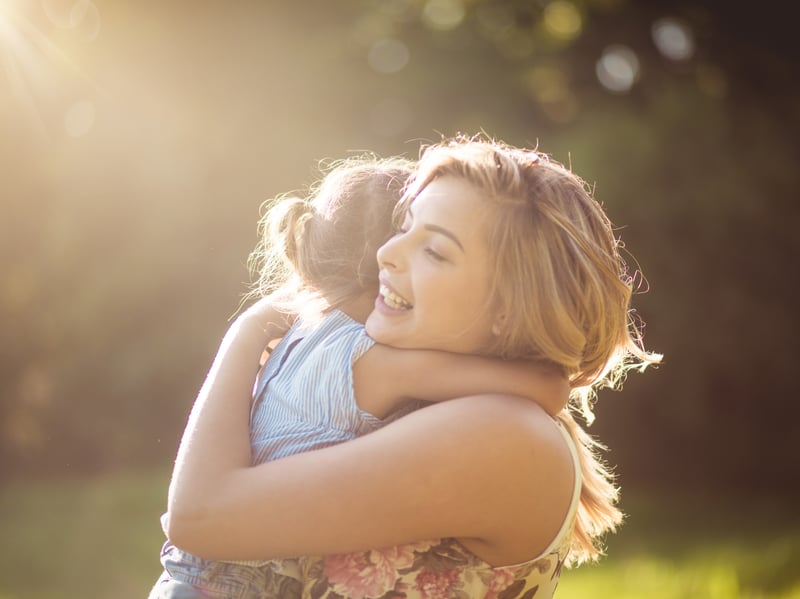Manténgase sano!

- Denise Mann
- Posted October 9, 2023
Want Your Child to Have Empathy? Stay Close
Young children who are close to their parents are more likely to grow up to be kind, caring and considerate. These kids may also have fewer mental health problems during early childhood and adolescence, a new study finds.
By contrast, children whose early relationships with their parents are emotionally strained or abusive are less likely to become thoughtful and generous.
"Taking time to build warm, close, comforting and understanding relationships between parents and children in early childhood tends to predict children's resilience against mental health difficulties, and increases their levels of prosociality throughout childhood and adolescence,"said study co-author Ioannis Katsantonis, a researcher at the University of Cambridge in the United Kingdom. Prosociality is an umbrella term that encompasses kindness, empathy, helpfulness, generosity and volunteering.
The findings make intuitive sense. "Children imitate their parents and so they learn social skills in the course of this that they later find helpful,"he said.
For the study, researchers analyzed data on more than 10,700 children born between 2000 and 2002. They interviewed parents and the kids at ages 5, 7, 11, 14, and 17, using standardized questionnaires that measure mental health symptoms such as depression, anxiety and aggression; socially desirable behaviors; relationships; and discipline practices.
Here's what the investigators found: The closer kids were to their parents at age 3, the more kindness, empathy, helpfulness, generosity and volunteering they expressed as they grew up. Conversely, kids whose early parental relationships were emotionally strained or abusive were less likely to develop positive social habits over time.
The study also found that mental health remains stable throughout childhood and adolescence. "After a certain age, we tend to be mentally well, or mentally unwell, and have a reasonably fixed level of resilience,"Katsantonis said.
Socially desirable behaviors, on the other hand, vary more and for longer periods of time, suggesting a larger window of opportunity to intervene and set kids on a new path.
"Closeness only develops with time, and for parents who are living or working in stressful and constrained circumstances, there often isn't enough,"Katsantonis said.
Some parents may also need help forming a secure, caring bond. "Policies which address that, at any level, will have many benefits, including enhancing children's mental resilience and their capacity to act positively towards others later in life,"he added.
Schools can also help. But the researchers said educational efforts to develop positive social habits should be ingrained in the curriculum, and not just presented as one-offs, like anti-bullying weeks.
The findings were published online Oct. 7 in the International Journal of Behavioral Development.
Experts who were not involved with the study agree that kids don't take after strangers.
This study "breaks new ground in understanding how parenting contributes to children's mental health and positive social behavior,"said Jessica Stern. She is a research psychologist at the University of Virginia.
The analysis "gives some of the strongest evidence that parenting really matters for healthy development in the long term, especially when it comes to preventing behavioral problems,"Stern said.
The study took place in Europe, but the findings are consistent with what is seen in the United States, she added. "More and more research is showing how children's mental health is inextricably tied to their parents' mental health, caregiving behavior and socioeconomic status,"according to Stern.
Parents and caregivers must remember that children often mimic their behavior. "Kids and teens who have experienced their parents yell, hit or shame them into behaving a certain way are more likely to yell, hit and berate others to get their way,"she said.
Her advice? "Instead of harsh discipline, parents can strive for empathic, 'kind but firm' discipline, which has been shown to promote mental health and positive social development in childhood and adolescence."
Maryam Abdullah agreed. She is the parenting program director at the Greater Good Science Center of the University of California, Berkeley. "Close relationships with parents help children deeply understand how to develop connections with other people beyond the home,"she said. "They develop a frame of reference of what strong relationships are like and can carry forward that compassionate way of being with others as well."
More information
HealthDay has more on the gentle parenting method.
SOURCES: Ioannis Katsantonis, PhD candidate, researcher, University of Cambridge, Cambridge, United Kingdom; Jessica Stern, PhD, research psychologist, University of Virginia, Charlottesville, Va.; Maryam Abdullah, PhD, parenting program director, Greater Good Science Center, University of California, Berkeley; International Journal of Behavioral Development, Oct. 7, 2023, online





